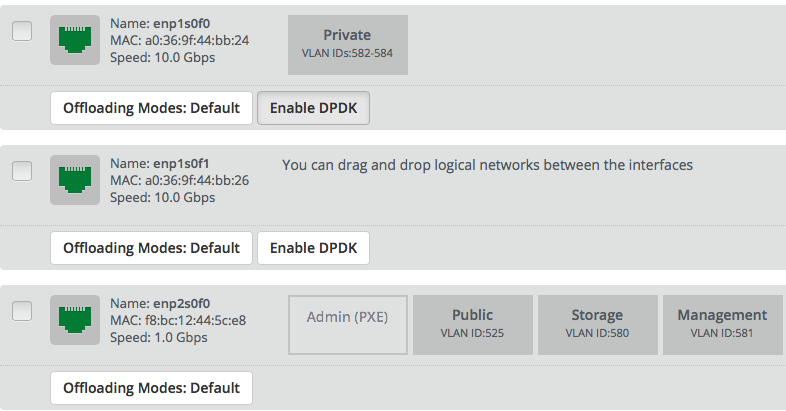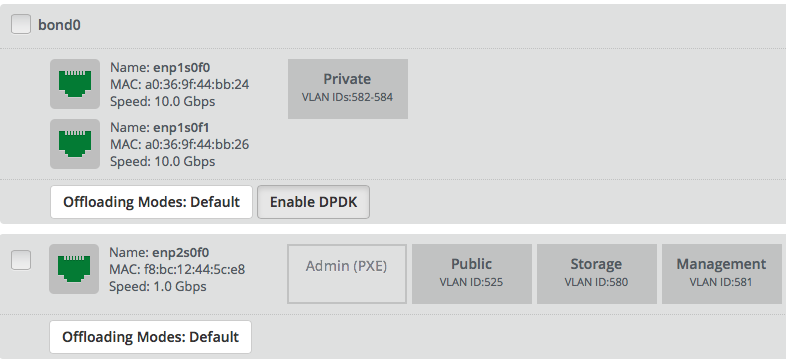Support for DPDK
 Atsuko
Ito
Atsuko
Ito
me@yottatsa.name
on LinkedIn Papers
In order to get as close to wire-line speed as possible for virtual machines, we want to install and utilize OVS with DPDK on some compute nodes.
https://blueprints.launchpad.net/fuel/+spec/support-dpdk
Problem description
DPDK-backed OpenVSwitch and vhostuser features are fully merged in OpenStack Mitaka. With this set of features operator could achieve a boost to the networking performance, and unlike SR-IOV, operator can still control traffic via OpenFlow rules.
Proposed changes
Enabling DPDK requires:
- Discovering compatible hardware by hardcoded compatible driver and model list, that extracted from DPDK website and drivers source code and hardcoded into Fuel settings.
- Providing operator with information about compatible NICs.
- Proper network configuration with dedicated Private network for VLAN segmentation.
- Configuring CPU isolation for OVS and DPDK PMD.
- Configuring memory amount for DPDK for every NUMA node.
- Making configurations on compute side, including nova, neutron, interface binding to the DPDK and OpenVSwitch.
Web UI
On Nodes tab, in Interfaces configuration screen for every interface or bond should be checkbutton to enable DPDK on network interface. It will be shown only if interface is DPDK-capable:

For bond, it will be shown only if all bonded interfaces are DPDK-capable:

Only Private network with VLAN segmentation could be placed on DPDK enabled interface or bond.
If no networks is placed on DPDK interface, that means that no changes should be done in deployment.
These validations should be done both on UI and in API.
Nailgun
The nailgun-agent should collect and send information information about PCI-ID of NIC. This information should be passed to nailgun in the next format
{ "meta": { "interfaces": [ { "pci_id": String, "numa_node": Number } ] }
The nailgun will compare PCI-ID against hardcoded into openstack.yaml list of supported hardware. List of supported hardware should also сontains dpdk driver name for every PCI-ID, that used in network scheme
dpdk_hw: igb_uio: [8086:1010, 8086:1012, ... ] <dpdk_driver>: <LIST OF PCI-IDS>
Data model
Next DPDK-related information is stored in interface_properties field of NodeNICInterface:
- PCI-ID of interface.
- NUMA node of PCI device.
- Whether DPDK is enabled by user or not.
Availability should be calculated when nailgun receive information from agent.
Data model for interface_properties should look like this
[ { "interface_properties" : { "dpdk" : { "enabled": Boolean or null, "available": Boolean }, "pci_id": String, "numa_node": Number } } ]
For bond interface, only dpdk dict is needed.
When operator configures interface as DPDK to use it for Private network, astute.yaml will be extended as following
Node-level parameter enabled will enable DPDK in OpenVSwitch on node. Other parameters should be defined and provided by HugePages and NUMA/CPU pinning features
- ovs_core_mask: OpenVSwitch cpu core mask in hexa format
- ovs_pmd_core_mask: OpenVSwitch core mask in hexa format for PMD threads
- ovs_socket_mem: List of amounts of memory to allocate per NUMA node
dpdk: enabled: True ovs_core_mask: 0x4 ovs_pmd_core_mask: 0x6 ovs_socket_mem: 128,128,128,128
Network transformations should include vendor specific attrubute datapath_type: netdev to br-prv bridge:
network_scheme: transformations: - action: add-br name: br-prv provider: ovs vendor_specific: datapath_type: netdevInterface should be added using add-port action with provider dpdkovs directly into OVS br-prv bridge:
network_scheme: transformations: - action: add-port name: enp1s0f0 bridge: br-prv provider: dpdkovsBond should be added using add-bond action with provider dpdkovs directly into OVS br-prv bridge:
network_scheme: transformations: - action: add-bond bridge: br-prv provider: dpdkovs bond_properties: mode: balance-rr interfaces: - enp1s0f0 - enp1s0f1 name: bond0New vendor specific attribute dpdk_driver should be added from hardcoded list of supported hardware (described above):
network_scheme: interfaces: enp1s0f0: vendor_specific: bus_info: '0000:01:00.0' driver: ixgbe dpdk_driver: igb_uio
REST API
Only payload for interfaces and node agent API handlers will be changed as described in Nailgun-agent and Data model sections.
Orchestration
None
RPC Protocol
Only payload changes.
Fuel Client
User will able to modify DPDK enablement on interface and network assignment it with fuel node --network --download/--upload because of REST API payload changes. No changes required in client.
Plugins
None
Fuel Library
Fuel library will consume data from astute.yaml.
- OpenVSwitch will be configured to use dpdk.
- vhostuser_socket_dir will be configured in plugin.ini on compute node to enable vhostuser in neutron.
- l23network will configure interface as dpdk, connect it to ovs bridge and store it in config.
Alternatives
To achieve the same networking performance SR-IOV could be used. Comparing to it, DPDK allows to use experimental Security Groups engine.
Upgrade impact
None
Security impact
None
Notifications impact
None
End user impact
User interface impact is described in Web UI section.
Performance impact
Performance penalties are not expected.
Deployment impact
This feature will require to use VLAN segmentation and dedicated DPDK capable network interface for Private network.
Developer impact
None
Infrastructure impact
This feature will be tested on virtual environment.
Documentation impact
TBD
Implementation
Assignee(s)
- Primary assignee:
- Atsuko Ito <me@yottatsa.name>
- Sergey Kolekonov <skolekonov@mirantis.com>
- Mandatory design review:
- Sergey Vasilenko <svasilenko@mirantis.com>
- Dmitry Teselkin <dteselkin@mirantis.com>
Work Items
- Collecting information about interfaces
- Enable DPDK configuration in fuel-library
- Support of configuring DPDK via fuel API
- Support of DPDK on UI
- Manual testing
- Create a system test for DPDK
Dependencies
This feature depends on HugePages and NUMA/CPU pinning features.
Testing, QA
- Test API/CLI cases for the configuring DPDK
- Test WEB UI cases for the configuring DPDK
- Test that DPDK is discovered and configured properly
- Performance testing
Acceptance criteria
User should be able to deploy compute nodes with network interface in DPDK mode, and boot a VM with vhostuser and HugePages enabled.